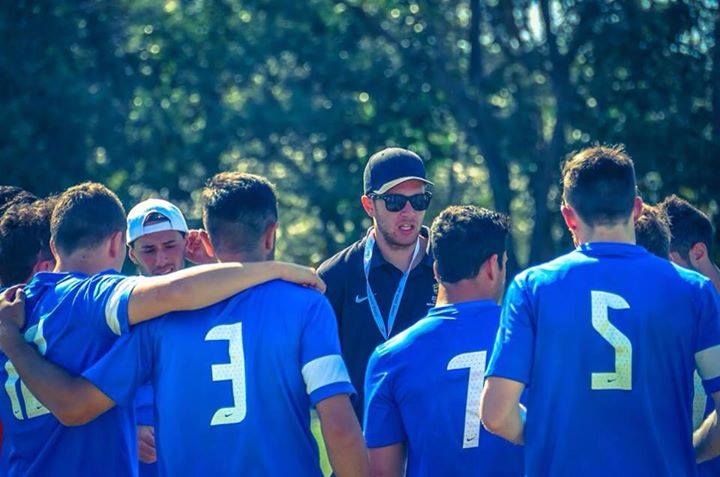Throughout time, Moreland Zebras (with a number of name and location changes) have seen the likes of Michael Theo, Billy Celeski, Mark Bresciano come grace the pitch, and a certain coach named Ange Postecoglou behind the scenes. The Zebras could be the another springboard for up-and-comer Riccardo Marchioli, one of Australia’s youngest AFC/FFA B Licence holders and the club’s new Technical Director.
The 23-year-old had a chat with the Corner Flag about his past and present jobs, women’s football, and his personal ambitions.
Mark Gojszyk (M): How did your Technical Director gig at Moreland come about? When did the club get in touch with you, and did you have other offers elsewhere?
Riccardo Marchioli (R): I had coached briefly at Moreland before joining the State Development Program. This year a close friend of mine, Stephan Achilleos, who is another excellent young upcoming coach, took charge of the club’s senior women so I went to the club whenever I could to help him and the team out. There are always other offers but there’s a different feeling around Moreland Zebras – a warm vibe that makes you fall in love with the place. For me, once the role became available there was no other option.
M: Technical Director at 23-years-old is an impressive feat. Were there any reservations from Moreland about your age or experience?
R: Some people are old at 18, others are young at 90. Only humans put so much emphasis on the age of a person and relate that to perceived ability. Moreland has an excellent track record not only with its players but with its identification and development of talented coaches and I think this stems from a belief in bringing in quality, regardless of a meaningless number on a timeline.
M: What do you plan to bring to the role?
R: Creativity and enjoyment. Like any good society, plenty of freedom within a degree of structure. I want to make the experience so engaging and exciting for the coaches that the enthusiasm is passed down to the players and they truly enjoy the experience of being a part of Moreland Zebras.
M: What personal stamp have you put on the club so far?
R: My mind has been a fireworks display of ideas since I knew I would be in the role. I’ve developed a basic football development plan to start with which is very flexible and will rely on constant input from coaches and players at the club. I have a ridiculously long list of notes, suggestions and thoughts which I will gradually act upon as I settle in.
M: What do you hope to achieve at Moreland?
R: This role is years in the making so there are many things that I’d like to see. Apart from setting high coaching standards and developing an exciting style of play and continuing to raise the attention to detail and quality of training sessions, the most important objective is to create a true culture of growth, both for the coaches and the players at the club. My main goal is to create an environment where the Moreland family are constantly motivated to improve on their own, away from a structured setting – both as footballers/coaches and as human beings so that when the time comes that they move on from Moreland, they have developed an intrinsic energy that carries them not only through football but also through other aspects of life.
M: Describe your experiences coaching Cairnlea last season – which seemed challenging at times – and women’s football overall.
R: Luckily, I had playing groups at Altona City and Cairnlea who were not only open to learning and developing themselves but also fun to be around. There were definitely more tears shed from laughter than from any result. That’s what you want from sport at the end of the day. Yes, it’s great to be competitive and to be challenged, but above all else you need to enjoy going to training and to games because you love being around the people you play with or coach, and that was definitely the case at both Altona and Cairnlea.
M: What opportunities and challenges does women’s football face in Victoria?
R: Women’s football still has to deal with many (often male) misconceptions especially in relation to the quality of the game. There are some very talented players throughout the WPL but I think one of the major challenges is increasing the talent pool before increasing the number of teams in the top league. The FFV have appointed Ash Callaghan to oversee the development of girls and women’s football in the state which is fantastic because she plays in the WPL herself and knows first-hand the improvement that is required in the overall number of talented players spread throughout the league.
The standard of media coverage and also coaching has risen tremendously in the past two seasons, and the majority of the league’s players are under the age of 25, so the environment and quality are constantly on the rise and the future looks positive.
M: How did women’s football help shape you as a coach and a person? (Not that a coach can’t also be a person)
R: The most important lesson I learned coaching women’s football was the need to be malleable. I kept encouraging my players to be flexible but then realised that I myself, was often rigid. Any good leader allows for some degree of adaptability to their environment, while bringing their own personal touch.
As Bruce Lee famously put it: “Be like water making its way through cracks. Do not be assertive, but adjust to the object, and you will find a way around or through it.”
M: How different is the transition from women’s to men’s football?
R: Hopefully I won’t have to undertake too much of a transition because I also plan to be heavily involved in the female side of things at Moreland Zebras. If we’re talking about the top flight – WPL vs NPL – in terms of comparing the two, the main differences are in the talent pool – number of high quality, professional players – and athleticism or overall speed of play. Let me tell you, there are some female players whose technical ability and game sense makes a mockery of a handful of their male counterparts. The most obvious difference though is the speed during transitional moments, when the ball is lost and when the ball is won, both in terms of composure and outright athleticism.
M: What are your own personal objectives for the upcoming season and beyond?
R: I mentioned creating a true growth culture and I will be leading by example by blending in with the Moreland family and learning as much as I can from everybody. Just because I’ve been honored with a fancy title, doesn’t give me an excuse to stop learning from the people around me. I have always tried to bounce ideas off my teams. The difference in this role is that my immediate team is no longer made up of players, it’s made up of coaches consisting of teams, players and experiences of their own, so the insights I can gather from my own team has accelerated. It means that now, in the highest role of my career, I will be learning more than I ever did.


